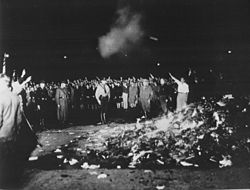Tyska studentkåren
Tyska studentkåren (tyska: Deutsche Studentenschaft, akronym DSt), grundad 1919 och upplöst 1945, var en sammanslagning av alla studentorganisationer vid tyska universitet, inklusive fristaden Danzig, Österrike och dåvarande tyskspråkiga universitet i Tjeckoslovakien. I början av 1920-talet drabbades DSt av allvarliga interna konflikter mellan den republikanska minoritetsfalangen och en majoritetsfalang som var Völkisch.
Från och med 1931 kom organisationen att domineras av Nationalsocialistiska tyska studentförbundet (NSDStB), med vilken den senare fusionerades (1936) efter många år av slitningar organisationerna emellan. Efter andra världskrigets slut förbjöds organisationen av Allierade kontrollrådet som ansåg att organisationen var nazistisk.[1]
Kampanj mot "otyskheten"

I april 1933 tog Tyska studentkåren, under ledning av Nationalsocialistiska tyska studentförbundet, initiativet till en aktion mot otyskheten, vilken kablades ut från centralt håll till alla tyska universitetsstäder. Studentkåren presenterade tolv teser, inklusive ett yrkande på censur, något som sedan en tid praktiserats. Efter att Tyska studentkåren utropat nationell samling mot "otyskheten" den 6 april 1933 genomförde medlemmar från Tyska studentkåren och Nationalsocialistiska tyska studentförbundet den 6 maj en planerad attack mot Institutet för sexualforskning som låg i Berlinstadsdelen Tiergarten. Några dagar senare (10 maj) togs innehållet i institutets bibliotek och arkiv till Opernplatz där det brändes. Uppemot 20 000 böcker och journaler samt 5 000 bilder förstördes.
Ordförande och riksledare (Reichsführer) på nationell nivå
| År | Namn | Organisationsbakgrund | |
|---|---|---|---|
| 1919‑1920 | Otto Benecke | (VDSt Göttingen) | |
| 1920‑1921 | Peter van Aubel | (Kath. Freie Vereinigung Köln) | |
| 1921‑1922 | Franz Holzwarth | (Göttingen) | |
| 1922‑1923 | Fritz Hilgenstock | (Hannoversche Burschenschaft Arminia) | |
| 1923‑1924 | Arthur Fritsch | (K.D.St.V. Winfridia Breslau i CV) | |
| 1924‑1926 | Hellmut Bauer | (Burschenschaft Teutonia Kiel) | |
| 1926‑1927 | Günter Thon | (Burschenschaft Arminia Brünn) | |
| 1927‑1929 | Walther Schmadel | (Burschenschaft Danubia München) | |
| 1929‑1930 | Erich Hoffmann | (Corps Austria Frankfurt am Main) | |
| 1930‑1931 | Hans‑Heinrich Schulz | (Corps Hildeso-Guestphalia Göttingen) | |
| 1931 | Walter Lienau | (NSDStB och Corps Isaria München) | |
| 1931‑1933 | Gerhard Krüger | (NSDStB och Burschenschaft Arminia Greifswald i ADB) | |
| 1933‑1934 | Oskar Stäbel | (NSDStB och Landsmannschaft Suevia Karlsruhe) | |
| 1934‑1936 | Andreas Feickert | (NSDStB Hamburg) | |
| 1936‑1945 | Gustav Adolf Scheel | (som Reichsstudentenführer i den sammanslagna organisationen mellan DSt+NSDStB) |
Se även
Referenser
Fotnoter
- ^ Nationalencyklopedin: nazism. Läst: 14 oktober 2011.
Media som används på denna webbplats
Flyer or poster issued by the German Student Union (German: Die Deutsche Studentenschaft), distributed in the spring of 1933 to justify the plundering of unwanted literature in Nazi Germany and the subsequent Nazi book burnings. The text expresses the so called "12 Theses against the Un-German Spirit", published on April 12, 1933. Instead of well-founded theses, it contains only the positions and goals of the "Action" or campaign (Aktion wider den undeutschen Geist) and denounces Jewish, social democratic, communist, and liberal ideas as well as their representatives. The "theses" were posted in red Fraktur script at German universities and printed by many newspapers.
English translation:
- Against the Un-German Spirit!
- 1. Language and literature are rooted in the people. The German people bear the responsibility to ensure that their language and literature are a purer and unadulterated expression of their national identity.
- 2. There is a contradiction today between literature and German national identity. This state of affairs is a disgrace.
- 3. Purity of language and literature lies with you! Your people have entrusted the language to you for faithful preservation.
- 4. Our most dangerous adversary is the Jew and those who are subservient to him.
- 5. The Jew can only think in a Jewish manner. When he writes in German, he lies. The German who writes in German but thinks in an un-German way is a traitor. The student who speaks and writes in an un-German manner is also thoughtless and disloyal to his duty.
- 6. We want to eradicate lies, we want to brand treason, we want for the student not places of thoughtlessness but of discipline and political education.
- 7. We want to respect the Jew as a stranger, and we want to take national identity seriously. Therefore, we demand from censorship: Jewish works appear in Hebrew. If they appear in German, they must be labeled as translations. The strictest measures against the misuse of the German script. German script is only available to Germans. The un-German spirit will be eradicated from public libraries.
- 8. We demand from the German student the will and ability for independent knowledge and decision-making.
- 9. We demand from the German student the will and ability to preserve the purity of the German language.
- 10. We demand from the German student the will and ability to overcome Jewish intellectualism and the associated liberal signs of decay in German intellectual life.
- 11. We demand the selection of students and professors based on the security of thinking in the German spirit.
- 12. We demand the German university as a stronghold of German national identity and as a battleground fueled by the power of the German spirit.
- The German Student Union.
(c) Bundesarchiv, Bild 102-14597 / Georg Pahl / CC-BY-SA 3.0
Die von den Studenten eingesammelten undeutschen Schriften und Bücher, werden öffentlich auf dem Opernplatz in Berlin, ins Feuer geworfen.


